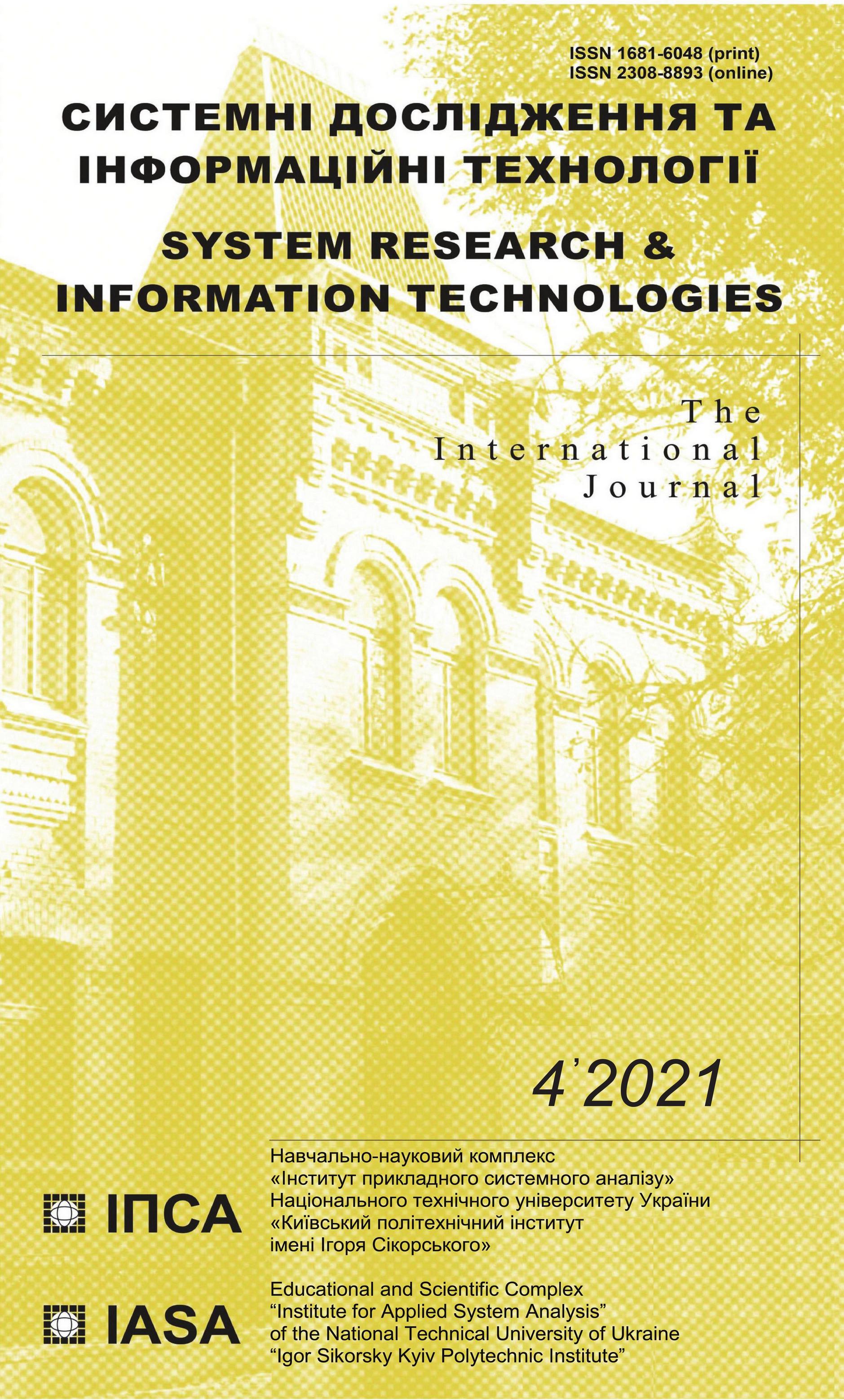On one approach to using of fractional analysis for hybrid modeling of information distribution processes
DOI:
https://doi.org/10.20535/SRIT.2308-8893.2021.4.10Keywords:
information, dissemination, modeling, diffusion hybrid models, fractional analysisAbstract
The article discusses a technique for constructing a model and a method for finding solutions in the problem of imitating the process of information dissemination based on the use of a boundary value problem for a fractional differential equation in partial derivatives. It is proposed to use the analogy technique for modeling information dissemination processes, which is based on the use of the features of a fractional analysis and the diffuse nature of information penetration processes. A method for constructing hybrid models is proposed, which makes it possible to take into account changes in the interval of values of the spatial variable over time. Homogeneous and inhomogeneous models of diffusion processes are considered, which make it possible to numerically obtain and analyze experimental data for solving problems of monitoring the levels of information dissemination in social groups.
References
Yu.I. Babenko, Fractional Differentiation Method in Applied Problems of Heat and Mass Transfer. Sankt-Peterburg: NPO "Professional", 2009, 584 p.
V.V. Vasil’ev and L.A. Simak, Fractional Calculus and Approximation Methods in Modeling Dynamical Systems. Kyiv: NAS Ukraine, 2008, 256 p.
I. Petras, Fractional nonlinear systems: modeling, analysis and simulation. HEP, Springer, Nonlinear Physical Science, 2011, 235 p.
R.T. Sibatov and V.V. Uchaikin, “Fractional differential kinetics of charge transfer in disordered semiconductors”, Semiconductor physics and technology, vol. 41, iss. 3, pp. 346–351, 2007.
K. Diethelm, N.J. Ford, A.D. Freed, and Yu. Luchko, “Algorithms for the fractional calculus: a selection of numerical methods”, Comput. Methods Appl. Mech. Eng., vol. 194, pp. 743–773, 2005.
A.N. Korchagina and L.A. Merzhievskiy, “Numerical modeling of diffusion processes in fractal media”, Scientific memories ZabSU, no. 3(50), pp. 53–59, 2013.
L.I. Moroz, “Numerical solution of one class of initial-boundary value problems for the fractional-order diffusion equation”, Vestnik AmSU, iss. 85, pp. 3034, 2019.
R. Bellman, Mathematical methods in medicine. Singapore: World Scientific Pub. Co. Inc., 1983, 268 p.
A. Nowak and R.R. Vallacher, “Computational Models of Social Processes”, Encyclopedia of Cognitive Science, pp. 81–84, 2006. doi: 10.1002/0470018860.s00639.
H. Quastler, The emergence of biological organization. New Haven and London: Yale University Press, 1964, 83 p.
H. von Scheel, M. Zakaria, and M. von Rosing, “Social Media and Business Process Management”, The Complete Business Process Handbook. Body of Knowledge from Process Modeling to BPM, vol. I, pp. 381–398, 2015. doi: 10.1016/B978-0-12-799959-3.00018-5.
R. Smith, Modelling Disease Ecology with Mathematics. Ottawa: American Institute of Mathematical Sciences, 2017, 291 p.
E.V. Ivokhin and L.T. Adzhubey, “About the use of diffusion process models for description of information extension dynamics”, Scientific Bulletin of Uzhgorod University. Series of Mathematics and Informatics, no. 1(34), pp. 86–93, 2019. doi: 10.24144/2616-2019.1(34).
E.V. Ivokhin and Yu.A. Naumenko, “On Formalization of Information Dissemination Processes Based on Hybrid Diffusion Models”, Journal of Automation and Information Sciences, vol. 50, no. 4, pp. 121–128, 2018. doi: 10.1615/JAutomatInfScien.v50.i7.70
E.V. Ivokhin, L.T. Adzhubey, and E.V. Gavrylenko, “On the Formalization of Dynamics in Information Processes on the Basis of Inhomogeneous One-Dimensional Diffusion Models”, Journal of Automation and Information Sciences, vol. 51, no. 2, pp. 22–29, 2019. doi: 10.1615/JAutomatInfScien.v51.i2.30
E.V. Ivokhin and L.T. Adzhubey, “On the modeling of information distribution dynamics on the basis of homogeneous diffusion hybrid models”, Scientific Bulletin of Uzhgorod University. Series of Mathematics and Informatics, no. 2(35), pp. 112–118, 2019.
E.V. Ivokhin, L.T. Adzhubey, E.V. Gavrylenko, and Yu.A. Naumenko, “Research of dynamics of information distribution processes based on diffusion hybrid models”, Radio Electronics, Computer Science, Control, no. 2, pp. 129–136, 2020.
R.I. Parovik, P.P. Firsov, and E.O. Makarov, “Mathematical modeling of the fractal dimension of the geoenvironment”, Vestnik of Kamchatka regional association UNC. Phys.-Math. Science, iss. 2(3), pp. 42–49, 2011.
E. Hairer, S.P. Norsett, and G. Wanner, Solving Ordinary Differential Equations I: Nonstiff Problems; (2nd ed.). Berlin: Springer-Verlag, 1993, 512 p. doi: 10.1007/978-3-540-78862-1.
B.M. Budak, A.A. Samarskiy, and A.N. Tikhonov, Task collection on mathematical physics. Moscow: GizTTL, 1956, 683 p. doi: 10.1016/C2013-0-05314-5.

